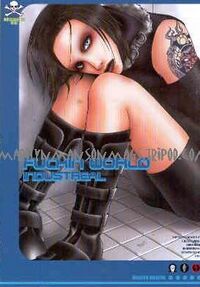Fuckin World Industreal
| Fuckin World Industreal | ||

| ||
| Written by Setsuya Kamei | ||
| Released: | 1999 | |
| Illustrator: | Setsuya Kamei, Miyamoto, Arijigoku | |
| Publisher: | Underground | |
| Narrator: | ||
| Media type: | Print (Paperback) | |
| Length: | 25 pages | |
| ISBN: | N/A | |
Fuckin World Industreal is a dōjinshi series by Setsuya Kamei, based on and depicting Marilyn Manson during the Portrait of an American Family era. The issues were published in 1999 by Underground, although very little is known about them. They have also never been properly translated to English. Either two or three issues were ever published, and regardless, the series was over by 2000.
The dōjinshi focuses on the offstage interactions between the band members – Marilyn Manson and Twiggy Ramirez more prominently – rather than the controversial antics the band and its members are known for.
Characters
- Marilyn Manson:
The main character, the series follows his interactions with the other band members, most prominently Twiggy Ramirez. He is the lead singer of industrial metal band Marilyn Manson. Manson's depiction in the series focuses more on his discreet offstage persona, rather than the outrageous persona explored in the official short film The Death Parade.
- Twiggy Ramirez:
A New Jersey native, he moved to Florida, where he grew up on Star Wars and heavy metal. He is the bassist of industrial metal band Marilyn Manson. Twiggy's depiction in the series is presented as the most arcane of the three, yet he manages to be much more open to Manson who it is apparent is his closest friend.
- Madonna Wayne Gacy:
A genius too mad to use his intelligence in any constructive way, he appears extremely polite in his interactions with Manson. He is the keyboardist of industrial metal band Marilyn Manson. He is shown to be extremely passive and observant.
Setting
The exact setting is uncertain due to the fact that the dōjinshi has never been properly translated to English. Using observations from the scenes depicted, only a hardly satisfactory idea of the settings can be established. In the opening (on pages 4, 5, and 6) Manson finds Twiggy sitting in an otherwise empty stairwell. Pages 9 to 16 are set in a seemingly run-down yet cozy flat, though it is unclear whether or not it is an apartment or a hotel room the band is staying at while potentially on tour. On page 16, Manson looks out the window where a fence with barbed wire on top can be seen. Pages 17 to 20 feature Manson and Twiggy outside, wearing winter coats and standing against a cracked wall. Pages 17 and 20 contain scenes of the sky in the surrounding area, which show power lines (and part of what appears to be a transmission tower), suggesting this is an urban residential region. This description is based purely on the appearance of scenes depicted, as there are currently no translations as of yet.
Cover Gallery
These pages are derived from the alleged first issue of the series. Template:Photos
Trivia
- Despite being set during the Portrait of an American Family era, Daisy Berkowitz and Sara Lee Lucas are not shown. Also Manson appears not to have any tattoos, despite in actuality having seven tattoos by this point in time.
- Madonna Wayne Gacy has a fascination with Japanese society and culture, which interestingly enough coincides with his depiction in a Japanese dōjinshi.
- Part of the title, misspelled as "industreal", is a portmanteau of the words industrial and real.
Personnel
- Setsuya Kamei – story, illustrations
- Miyamoto – illustrations
- Arijigoku – illustrations
- Marilyn Manson – adaption